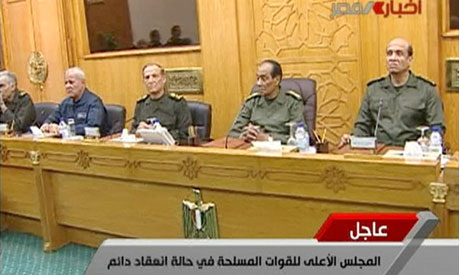 |
| SCAF - Assisting the Transition to Democracy |
There is another, less obvious corollary to this eternal truth, but one that, in the wake of events in Egypt, very likely has single party rulers and Presidents for Life frantically examining their strategies for remaining in power. That is, very simply, that while dictators depend upon the military for their power and office, the military does not have an equivalent requirement for the dictator. Oh, sure, to maintain their unlimited wealth and power they need A dictator, but it really doesn't matter who the despot in power happens to be. It's helpful if he or she is a compelling, charismatic leader, but often not necessary.
It is this lesson that serves as the end-game for the Egyptian revolution. The military always was the power, and the Mubarak clan was nothing but the (fully interchangeable) figurehead. He took power with an air of credibility after the assassination of Anwar al Sadat, but as the years went by it became obvious that he had no intention of relinquishing the Presidency under any circumstances other than death. And there was never any doubt that the real power in Egypt was the military, and Mubarak would stay in power exactly as long as his role in that position served the requirements and expectations of the Air Force in particular, and the military leadership in general.
And when it appeared that the 'Arab Spring' had come to Cairo, and the people would achieve freedom and self-determination, the military recognized that Mubarak could not survive in office, so they never hesitated to throw him under the bus - er, the tank. And in a move of large-scale political jiu-jitsu, a move not without a certain elegance, the generals formed the Supreme Counsel of the Armed Forces to assist the transition to a new, democratic government, providing governance and security in the period of elections and writing a new constitution.
But, of course, the generals never had any intention of allowing their hated enemy, the Muslim Brotherhood, achieve any kind of real authority, but in a larger sense, they never considered giving up even a shred of their own power. A democracy would serve as well as a despot - as long as it was ultimately subservient to military authority. So under the authority of the "benign" SCAF, the generals undertook a series of carefully managed strategic acts to cement their power regardless of how the democratic process developed. First they restricted the candidates who could stand for election, making sure the new political parties were weakly represented. Next they dissolved the Committee assembled by the newly elected Parliament that was to write the new constitution - on the premise that it was stacked with Islamists. The fact that the Brotherhood and their Salafi allies HAD overstepped on the Constitutional Committee allowed a certain cover of credibility to this action. But then, mere days before the election, the SCAF used its influence over the Judiciary to dissolve the new Parliament completely. And with that, the soft coup was complete and the revolution utterly co-opted.
Now there will be a President - either the Brotherhood candidate Mursi or the former Mubarak Prime Minister Ahmed Shafik - but he will be without a legislative body, ruling under the old Egyptian Constitution, and utterly dependent upon the military, just as was Hosni Mubarak before him. Now the military will have control over the new Constitutional process, and will have another chance at getting the Parliament they want. There will be no civilian control over the military, and there will be no changes to foreign policy positions without the general's approval. This includes, of course, the most contraversial foreign policy of all, the peace treaty with Israel. The generals want to continue to receive American aid and weapons - the treaty will remain in place.
All around the world, dictators are looking at this outcome and swallowing hard. Egypt figured out how to allow the Arab Spring revolution to succeed without any significant change to governance and business as usual. The formula is in place now - the despot is disposable, and the revolution can be managed. al-Assad's slaughter represents the last gasp of of the old ways, an unsophisticated iron fist that costs the country wealth and prestige and is, ultimately, counterproductive even to the goals of the dictator's government. Peaceful revolutions can be allowed to succeed, and by doing so, they will ultimately fail.
Update 6/18/12:
In the midst of utter chaos in Cairo, while the lesser of us try to make some sense out of the latest claims and decrees, Marc Lynch finds the perfect explanatory analogy: Calvinball...
...
Early days. Since everything of note is in Cairo, which is full of pissed off people, I think there's some hope. We shall see.
ReplyDeleteThe Muslim Brotherhood co-opting of the movement reminds me a lot of Iran.
I wonder when they'll all adopt our model: 'Competing' parties and media, all controlled by the same small group of plutocrats.
ReplyDelete~
Iran's an interesting comparison, McG. Remember that Khomeini purged the crap out of the Iranian military. He executed or imprisoned the entire officer corps. He was the rare despotic ruler who didn't need the military because he had so much popular support. Of course, when Saddam attacked in 1980, all his pilots were in prison, which presented a serious case of unintended consequences...
ReplyDelete